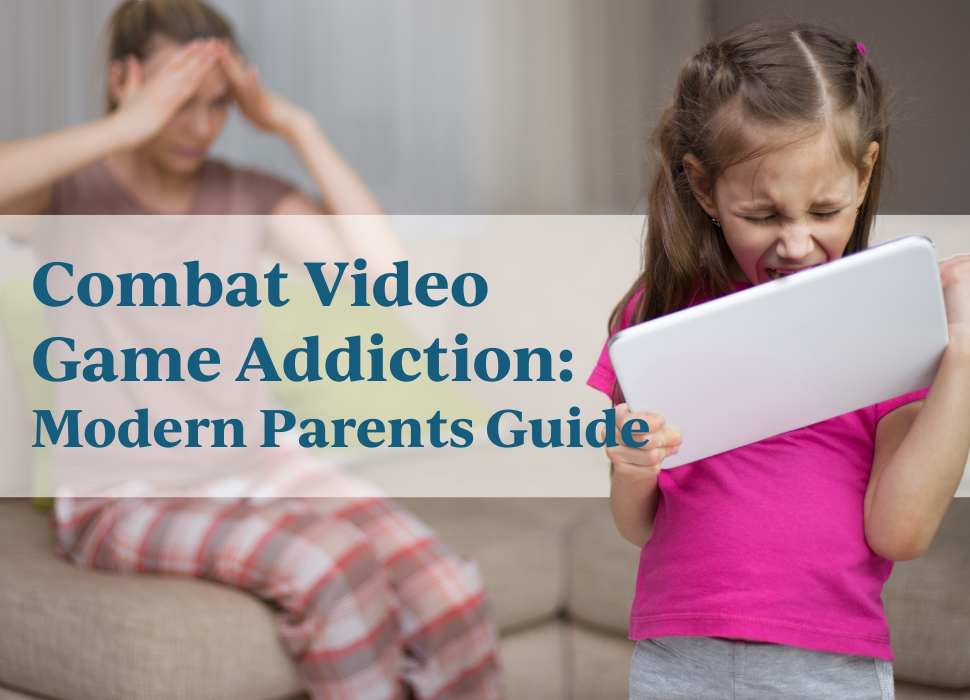
Combat Video Game Addiction: Modern Parent’s Guide
-
By John Burke
-
April 15, 2024
Remember the good old days of your youth when you would spend your leisure time watching Michael Jordan soar across the screen or listening to your favorite tunes on compact discs? Or perhaps you fondly recall the excitement of guiding Pac-Man through an endless maze, gobbling up dots, and avoiding colorful ghosts.
Fast forward to the present, and you might find yourself grappling with your child’s fascination with the virtual worlds of Fortnite, Clash Royale, or Minecraft. Unlike Pac-Man, many modern games are incredibly engaging, and if you’re worried your child might be struggling to unplug, you’re not alone.
Today’s digital playgrounds are elaborate, captivating, and even potentially addictive. So, why can’t your child put down the controller?
The Science of Video Game Addiction
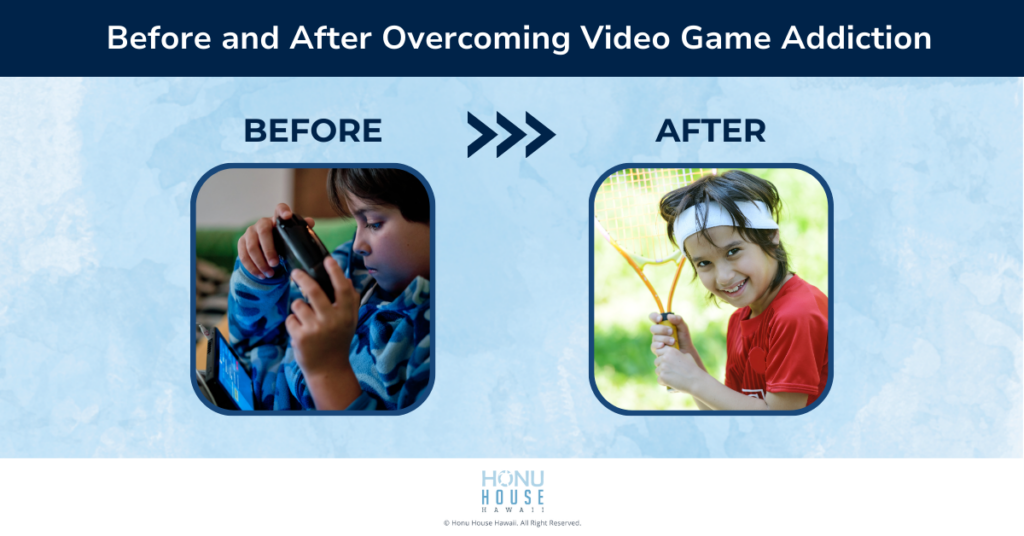
Many young gamers (and, let’s face it, even some adults) find it difficult to stop gaming due to dopamine. Dopamine is a chemical messenger in our brains that plays a huge role in how we feel pleasure.
Playing video games triggers dopamine release, rewarding players and encouraging them to keep playing. Dopamine is sort of like the brain’s way of saying, ”Hey, I enjoy this. Let’s do it again!”
When your child plays video games, their brain gets a dopamine shower with every achievement, making them want to continue playing. It’s a natural response, but like anything in life, it can lead to addiction if it isn’t done in moderation.
Dopamine is pretty much like the weather. It can be comforting, like a cool breeze on a sweltering day. However, it can also be erratic and turn into a destructive hurricane.
Gaming in moderation is akin to a relaxing breeze on a scorching day. However, when done excessively, it can become like a relentless hurricane, leading to a sedentary lifestyle, anxiety, and social awkwardness. Check out this video to understand and overcome video game addiction.
How to Spot Signs of Video Game Addiction
How can you determine whether your child is becoming addicted to video games? While it’s not always easy to spot, here are some common signs to look for:
Preoccupation With Gaming
Children addicted to video games often constantly think about them, even when not playing. If your child talks about video games endlessly, even when not playing, it could be a sign of video game addiction.
Loss of Interest In Other Activities
Children addicted to video games often lose interest in other recreational activities they once enjoyed, such as spending time with friends, playing sports, or participating in hobbies.
Sneaking to Game
If you’ve stumbled upon your child gaming late at night multiple times when they should be asleep, it could be a sign of video game addiction.
Mood Swings and Irritability
If your child regularly gets irritable when they can’t play, they might be addicted to video games. They might also be addicted if they become angry or aggressive when you cut off their gaming time.
Physical Health Problems
In extreme cases, video game addiction can cause health issues like headaches, eye strain, and poor posture. If your child exhibits any of these symptoms, it could be due to excessive gaming.
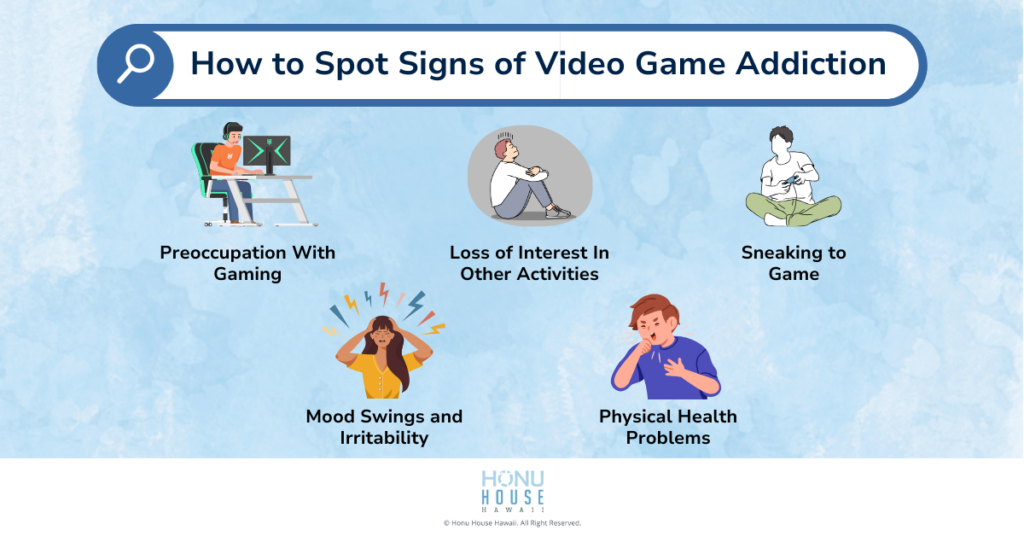
How to Combat Video Game Addiction
Getting your child to put down the controller can feel like an insurmountable challenge. But it isn’t impossible. Here are some strategies you can deploy to help your child find balance:
Encourage Outdoor Activities
Urging your child to explore the world beyond screens is a good start. Physical activities, exploring nature, and participating in sports can offer healthier dopamine boosts and improve physical and mental well-being.
You could also sign up your child for a sports league to encourage them to consistently participate in sports (so long as it’s not electronic sports). 🙂
Conduct Emotional Check-Ins
Sometimes, gaming is an escape from the challenges of the real world. Here’s how video games can be appealing to children battling with difficult emotions or situations:
Escape and distraction: Video games provide an immersive world where children can temporarily escape stress or worries like poor grades or trouble making friends.
Mastery and accomplishment: Video games provide a sense of mastery and achievement. This can be especially rewarding for children who might struggle with success in other areas like academics or sports.
Social connection: Many video games encourage interaction by bringing together players to work together towards a common goal. These games can be especially appealing to children who struggle to forge friendships or feel isolated.
Talk with your child about their emotions to find the underlying reasons for turning to video games. Often, children use video games as a coping mechanism to deal with challenges.
Establish a Structured Routine
Create a structured routine to curb video game addiction. Here are some strategies you can implement to establish a routine:
Set limits on non-educational screen time: Establish a set time limit for your child to play video games daily.
Encourage breaks: Set regular breaks every half an hour or so to reduce your child’s screen exposure and discourage excessive gaming.
Dedicate time for other activities: Ensure your child has set aside time for activities like hanging out with friends, playing sports, or even decompressing.
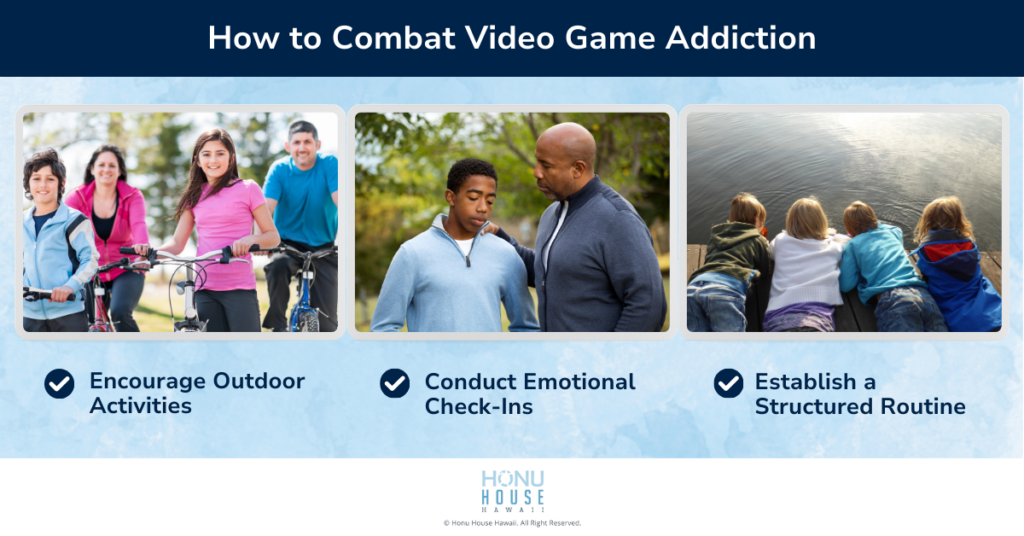
Implement a Balanced Lifestyle
Creating a balanced lifestyle for your child doesn’t mean cutting video games out cold turkey. That would probably just lead to having an extremely cranky child anyway. It’s about moderation, creating boundaries, and enriching your child’s life with diverse experiences.
So, encourage your child to participate in activities that don’t involve screens, like reading, playing sports, or learning an instrument. These activities not only provide alternative sources of recreation but also help in developing a well-rounded character.
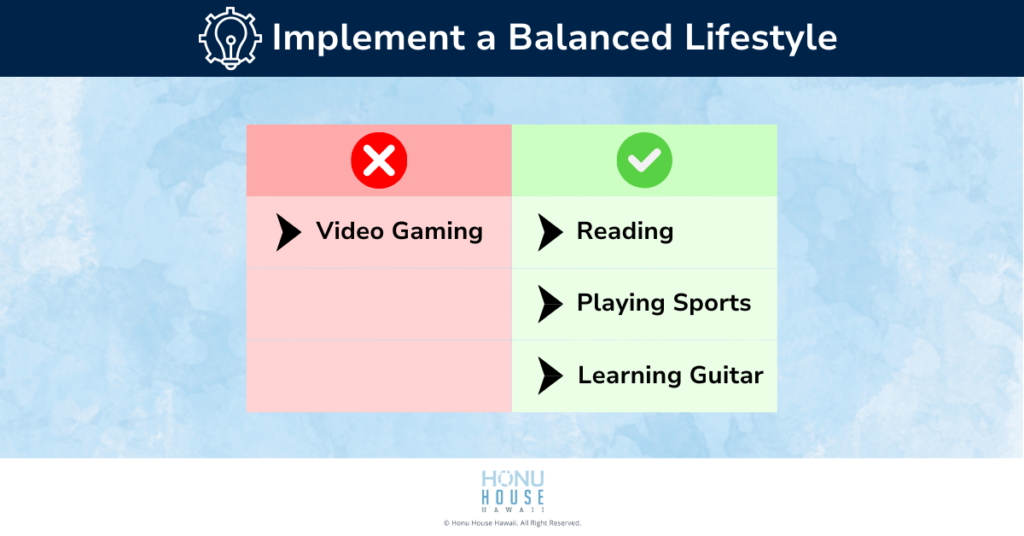
Get Help for Video Game Addiction
Video game addiction is a condition that affects many American children and teenagers. In fact, according to an American Academy of Pediatrics study, about four out of five gamers aged 8 to 18 are addicted to video games.
If you’re concerned your child might be playing video games excessively, consult a mental health professional like a therapist. These professionals can help your child overcome video game addiction by using addiction treatment interventions like:
Cognitive behavioral therapy (CBT): CBT is a unique intervention that can help your child identify unhealthy gaming thoughts and behaviors and help them develop healthier coping mechanisms. It can also address any underlying issues that might be causing video game addiction.
Family therapy: Sometimes, family dynamics or communication issues could contribute to your child’s gaming addiction. Family therapy can enhance communication, address any underlying conflicts, and create a unified approach to support your child’s recovery.
Group therapy: Connecting with others facing similar challenges can be beneficial. Group therapy can be especially helpful for older children and adolescents, as it can create a safe space to share their experiences with peers outside of the virtual world.
Educational workshops: This intervention can be a great way to educate your child about the dangers of excessive gaming and strategies to strike a healthy balance.
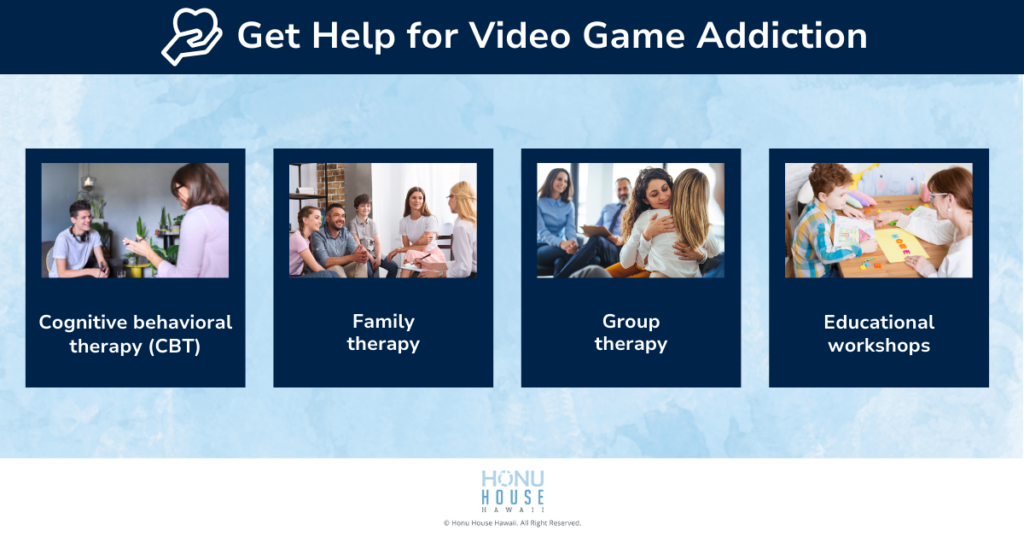
At Honu House Hawaii, we have a skilled team of professionals who use a holistic approach to addiction treatment. Contact us today to discover ways we can assist your child in breaking free from video game addiction.
Content Source: https://www.youtube.com/watch?v=HwLTJqbaAWs
Blog Credit: https://www.hba.net/
FAQs
How Can I Tell If My Child Has a Video Game Addiction?
While addiction signs vary, some key indicators include excessive time spent gaming, neglecting other activities and responsibilities, changes in mood or behavior, and withdrawal symptoms when not playing. If gaming impacts your child’s schoolwork, sleep, or social interactions, it might be time to take a closer look.
Is It Harmful to Let My Child Play Video Games For a Few Hours Daily?
It depends on the balance with other activities. Moderate, controlled video game play can be part of a healthy lifestyle, particularly if it includes educational content. The key involves ensuring gaming doesn’t precede physical activity, study, sleep, and real-life social interactions.
What Should I Do If I Think My Child Is Addicted to Video Games?
Have a candid and empathetic conversation with your child about your concerns, focusing on the changes you’ve observed in their behavior or mood. Encourage them to talk about how they feel about their gaming habits to unearth any underlying issues causing the excessive gaming. If necessary, consider seeking help from a mental health professional specializing in addiction treatment.
Are Some Video Games More Addictive Than Others?
Games with endless levels, frequent rewards, social interaction, and competitive elements can be more engrossing and potentially addictive. Massively Multiplayer Online Role-Playing Games (MMORPGs) can be tough to stop playing. Explore the game mechanics of the game your child is playing to determine whether it’s designed to keep players absorbed for extended periods with no clear end.
Is Video Game Addiction Treatable?
Like other types of addiction, video game addiction is treatable, often through a combination of various therapies, lifestyle changes, and support from family and friends. Cognitive Behavioral Therapy (CBT) is especially effective in treating video game addiction by helping gamers understand their gaming habits, identify triggers, and develop healthier coping mechanisms.
